The Battle Against Misogyny at Spelman College
By Banah Gha
As a student at Spelman College, I want to share our story of activist organizing against misogyny, misogynoir, as Moya Bailey puts it, on our campus. This is a project of recording our stories, our traumas, our frustrations as the vibrant womxn* we are in this campus community. It is a decolonial project to record our stories. Our narratives that have been rendered invisible over and over. This is a story about the forces in your own home that try to swallow you whole. This is a story about unraveling, as Audre Lorde says, the deepest parts of us that hold loathing and seeing what lives there.
This is the Women Against Violence Brigade—a collective of sister-scholar-activist-writers that originally emerged from the Fall 2012 Violence Against Women Sociology class taught at Spelman College in Atlanta, Georgia, overlapping with the Audre Lorde seminar taught in the same semester.
Our professors in the classes encouraged us to choose an activist issue on campus implicated in the continuation of violence against womxn on our campus and create a protest around it.
There was so much to cover. But what could we focus on, what would be small enough to address an entire structural set of internalized values? How could we talk about the ways in which women’s bodies are commodified on our campus, specifically how Black women and women of color bodies are hypersexualized and molded into white supremacist standards of femininity—as exemplified by our virginal “White Dress Tradition,” the heteronormative pairing of Spelman women with Morehouse “brothers,” as part of our initiation into the campus community, and the now-abolished requirement to wear dresses the first 12 days of New Student Orientation? Could we talk about the requirement for Biology students to straighten their hair during class presentations? How could we talk about these issues between and among us, as a campus community supposedly devoted to the empowerment of women of color?
We thought about our social events on campus—and of a weekly event called Market Friday, where local vendors and DJ’s come to our campus for a good time. As a group of friends several of us used Market Friday as an entrepreneurial platform, selling vintage clothes and original jewelry to raise money for our bills, pocket money, and student loans. After hearing about sexual harassment at Market Friday, a few of us decided to address the issue head-on. We wanted to choose a small microaggression to address larger issues of internalized misogyny on our campus, so we thought about the music played in the background of Market Friday. At the beginning of the day, smooth jazz and Sade float through the event, but around 2pm, when all the men rush to campus to “watch the women dance,” everything from 2 Chainz to Rick Ross starts blasting. While we didn’t want to make it about respectability politics or shame anyone for dancing or enjoying themselves, we did want to point out the blatant contradiction in blasting misogynistic music on a historically Black women’s college campus. We wrote the following petition, and starting amassing signatures:
Dear Office of Student Life and Engagement,
“All I want for my birthday is a big-booty hoe.”
These are the type of lyrics we are surrounded by while perusing local vendors each Market Friday here at Spelman College. As Spelman women, agents of change, global citizens entrusted to bring about free-thinking dialogue wherever we may go, is it acceptable for us to be subject to demeaning, misogynistic, homophobic, and sexually explicit lyrics in spaces we occupy? Additionally, what about the visitors who enter our campus and encounter this music as their representation of Spelman?
As Market Friday is an arena for our own community and creative expression, having all-male DJ’s constantly reinforce the notion that we exist only in relationship to the male gaze directly contradicts the values of Spelman.
Rather than play the infectiously offensive synthetic reels of Rick Ross, Young Jock, Lil Wayne, 2 Chainz, why don’t we introduce more women-friendly musical diversity into our soundtracks?
We, as socially aware Spelman women, propose to create our own misogyny-free playlists in order to make the musical selection more democratic and representative.
Like the Nelly protests in the past, Spelman women have historically been conscious of the standard for what we as students allow to permeate our campus.
We echo the sentiment that students should have a good time socializing and appreciate the efforts and activities the Office organizes. However, it would be of great help if we may be able to determine what having a good time means.
Respectfully,
Dr. Spence’s Violence Against Women Class, Fall 2012
The class created a series of events for the month, addressing various issues concerning violence against women, from human trafficking to intimate partner violence. By petitioning what was logistically a small issue, we hoped to unravel the large systems at work and begin conversations on the complex nature of misogyny on our campus.
As we began amassing signatures for our petition with relatively little controversy, our activist journey took a quick turn. Over the course of a few hours, a rumor had spread on twitter that a group of feminist-lesbians-bitches were trying to ban the DJ’s from playing at Market Friday. Suddenly, the situation snowballed and the DJ’s called for a counter petition.
After seeing violent threats, whether serious or not, a relatively small situation turned into a hostile ordeal; we ran to our Social Justice coordinator for advice. She told us about an LGTBQIA tolerance meeting happening that same day, where administrators could lend an ear to what was happening. This would be the perfect time to testify what had happened—how a petition against misogyny elicited a backlash of misogynistic responses.
We ran across campus with the petition, a proposal we had created, the DJ’s tweets and lyrics from the songs in hand. When we arrived at the meeting, we were advised to sit outside. We listened to the muffled shouts of the meeting, “We need to protect those women!” to “Let the students choose what kind of fun they want to have!” When we entered, the room was heavy with silent tension. “Please introduce yourselves,” we were advised. We went around the room each testifying about the ways misogynistic music playing at social events and even in the cafeteria on some days provided fertile ground for a range of intimidating and hostile environments on our campus.
Once they heard our testimonies, one of the administrators made some clicking noises on her laptop and announced, “There! Problem solved! I banned the DJ’s.” We looked at her in disbelief. After spending the last hour carefully explaining the ways misogyny created hostile environments and how it presented itself throughout campus, the entire complexity of the issue had been reduced down to the very thing sparking all the outrage. While we did understand how the DJ’s were encouraging cyberbullying and hate speech, I remember feeling frustrated with the way our critiques of larger systems at work were disregarded for an instantly gratifying quick-fix solution.
Afterwards, word got out that the same feminist-lesbian-bitches who started the petition had effectively banned the DJ’s—ruining all the fun. The social effects were cataclysmic. Now people wanted to know who we were, and some of our peers had even turned over a list of our names and contact information to the people threatening us. Those of us who were associated with the petition would walk into a room and the room would immediately turn quiet. Whispers fell on our shoulders, “That’s them, I think that’s one of them that started it!”
We were social pariahs, already too-queer, too-poor, too-different, too-weird—now those things increased tenfold, both in physical and virtual spaces.
We were accused of betting on respectability politics, and even when the institutional powers listened to us, it was to co-opt our voices for their LGTBQ sensitivity initiative. The Women’s Center, sociology and anthropology departments, and the halls of our newly renovated social justice dorm became our refuge. We attended meeting after meeting with the student government association, who reprimanded us for “breaking their constitution…eliciting illegal” signatures and not consulting them first on the matter, despite that a member of the student government was in our class and fully involved when we crafted our petition.
We held a meeting in our Violence Against Women class with the president of our college, several deans, and the president of the student body at the time. It was so heated as we insisted on telling our stories and we were continuously silenced by the students’ bizarre technicalities. “No one knows what misogyny is. You need to educate the student body about that before you go attacking it,” and “You should have asked for our permission first. Your approach was inappropriate and divisive.” “If you’re protesting against misogynistic music, why didn’t you protest against financial aid, against [x] issues that matter?”
The clash between those desperately invested in the system and the huge amount of resentment we faced for daring to transgress the system echoes a tension that emerges in larger social movements. From how sexuality and gender were deprioritized over race in the Civil Rights movement of the 1960’s, to the ways in which the white feminist movement disregarded womxn of color voices, those differently marginalized are often left out of struggles because their identities are not easily molded into a single-axis. As Audre put it, “there is no thing as a single-issue struggle because we do not live single-issue lives.”
At the same time, when our Morehouse “brothers” so much as dropped a single call for solidarity, Spelman women were in starched business attire at 6AM to protest side by side with them, engendering a long history of solidarity to our “brother-school” over solidarity amongst us. As Drs. Guy-Sheftall and Johnetta B. Cole cite Nelson George in Gender Talk, there is a “knee jerk defense of Black male privilege in African American communities.” Why couldn’t we amass the same kind of solidarity Morehouse students had when protesting a day off for election day? We faced similar roadblocks after engaging in a dialogue with a Morehouse class taught by Dr. Rice on Men’s identities. We posed the question to them, “would you enact a similar petition on your campus?” to silence and timid laughter. Although the professor made concerted attempts to have his students fight with us, and asked them to draft a similar petition as part of their final exam, we couldn’t help but wonder, where was our solidarity?
In the meantime, a few of us who overlapped between the Violence Against Women class and the Audre Lorde seminar desperately searched the archives for some advice in the sheaths of her handwritten wisdom. We knew,
It is learning how to stand alone, unpopular and sometimes reviled, and how to make common cause with those other identified as outside the structures, in order to define and seek a world in which we can all flourish. It is learning how to take our differences and make the strengths. For the master’s tools will never dismantle the master’s house.
Our own organizing collective erupted in internal drama more than once, as we were struggling to cope with the ways patriarchy and other forces were intimately related and felt in our lives.
From those of us facing homelessness and heartbreaks, babysitting one-year-old sisters in their dorm rooms at night, dealing with financial aid and family issues, we were each confronting the ways that power and the abuse of power could hold us hostage. We were struggling to dismantle the master’s house with our own tools.
I was also coordinating a project through the Social Justice program around Syria—where our solidarity protests at Market Friday were directly hit by the music petition fiasco. Because of a counter-petition circulating on twitter, and its call for a boycott of Market Friday, other social justice initiatives were directly hit. Very few saw our attempt to amass solidarity, on a campus that was struggling with its own issues around it. How could I begin to connect the urgent struggle of Syrian refugees and activists to the struggle against misogyny on our campus?
In larger activist circles who organize for Syria in the United States, it is equally as difficult to amass solidarity. It is much easier to mobilize around a “common enemy,” like U.S. imperialism, colonialism, and race-based struggles rather than build support around intersectional movements that require holistic understandings of how those forces interact with gender, class, ability, and other systems of oppression. The Syria cause, like our misogyny cause, although centered around a particular experience—living under dictatorship, or experiencing sexual harassment, for example, encompass complexities that are difficult to explain to larger audiences. In Syria, for example, it is difficult to rally support against a totalitarian regime that emerged after independence from French colonialism, because it requires deconstructing forces not inside the master’s house, but inside your own. On our campus, it is easier to conceptualize fighting for Troy Davis than fighting for Renisha McBride or Cece McDonald, because then we would have to talk about patriarchy, transphobia, and queerphobia on our campus. Then it wouldn’t be so easy. The common enemy is not out there, but within each of us.
Fast forward to spring semester. The WAV (Women Against Violence) brigade had officially formed as a collective force to organize around issues related to misogyny, ableism, transphobia, classism, and queerphobia on our campus. A Spelman student had been raped by three Morehouse basketball players and a slew of victim blaming in both campus communities emerged. We organized two weeks of events for the HBCU-wide “Denim Day” initiative with speak outs, a movie screening of NO! The Rape Documentary by Aishah Shahidah Simmons, a clothesline project and a Take Back the Night Rally where somebody muttered, “Bitches..” as our group walked through campus.
The students who wouldn’t stand with us before, who made it clear that the differences we embodied were something that they reviled, decided to organize a separate protest after we asked if they’d like to move in solidarity with us. It was a Slut Walk, of all things, on the same week as our march. Their protest was a success, hugely supported by our “brothers” who had shamed us before. They became the face of student activism against misogyny on our campus. This was frustrating because Slut Walk was directed towards the male gaze. In stark contrast, when we questioned gender violence and reclaimed our spaces through the Take Back the Night Rally, we did not receive any solidarity from men, but did receive hostility and more harassment.
Where does this fit into the matrix of activist organizing on college environments and larger social movements? In Syrian activist organizing the same contradictions exist. The women and children who started the movement were pushed to the side when it became a militarized struggle in September of 2011,—the macho freedom fighters became the face of the movement, instead of the grandmothers who were cooking their food. As a result, the freedom-fighters—young, able-bodied men, fought for their priorities in the movement, and those who started it, who labored for it and died for it, were silenced in the long run. From the Black Panthers to the Algerian Revolution, to fighting against apartheid in South Africa, women who challenge patriarchy and the forces in their own home start revolutions, but are often not allowed to finish them. Those without normative bodies, those who experience sexual harassment and are trying to deconstruct and decolonize their own traumas, who are on the road to healing, are often not heard. Arundati Roy puts it best when she says, “There’s really no such thing as the ‘voiceless’. There are only the deliberately silenced, or the preferably unheard.” As Audre Lorde puts it, these are the stories that need to be shared, they are when:
I crawl into dawn
corn woman bird girl sister
calls from the edge of a desert
where it is still night
to tell me her story
survival
Rock speaks a rooster language
And the light is broken
clear.
Using Dr. Alexis Pauline Gumbs’ pedagogy as one of our foundations from which we build; we are learning to mother ourselves through this activism. Reaching into those deeps parts of ourselves where healing needs to happen, where the internalized ableism, transphobia, misogyny and self-hate lives—the powers invested in us by larger forces who want to tear us down. Reaching into those parts of ourselves connects those feelings in one constellation of growth and of love for our infinite possibilities—as a community, in our relationships, in our homes. This is for the ways we want to give birth to institutions that nurture us, ones that can carry our pain the ways our bodies have carried our pain.
This is about the ways homes can work to eat us alive and how we try to kick, scream and fight our way out, make others angry, make ourselves angry and move through that anger to create something beautiful for ourselves. It is to transform hostile spaces into inclusive ones, to tear down the borders between us that prevent us from listening, from understanding, from believing one another, making that pain visible and not carrying it silently, no matter how many times we are conditioned that it is ungrateful for us to critique our institutions. As Edward Said put it, to criticize something is an act of love. It is learning to stand apart, together, reviled, knowing that our silences will NOT protect us. No matter how many benefits come from harboring that silence—even if those silences allow us to navigate spaces and survive easier—we know that those silences can eat through our throats, burn into our stomachs and poison the ways we interact and respond to one another’s traumas.
It is recognizing the internal differences among us—and even our different approaches to activism— to understand that those differences do not polarize us, but make us more beautiful, make our stories that much more necessary to tell. It is telling our stories that allows us to stay alive /afloat / bridge our vulnerabilities together in sustainable, real, transformative ways.
*I personally insert the X as a form of resistance against hegemonic constructs of womanhood that exclude trans womxn in particular. It is my way of naming the myriad of experiences and ways of performing gender Spelman womxn have, that we are often silenced discussing in our campus community.
_________________________________________________________
Banah Gha. is a cis femme student, muslimah, and poet raised in in the U.S South. She rallies for refugee rights, environmental justice, anti-imperialism, disability justice, anti-zionism, transnational feminist issues and the eradications of all oppressions. In her free time she creates and sells jewelry, and writes about womxn’s nonviolent resistance in the Syrian revolution. She likes traveling, eating mangoes and sculpting eyebrows.

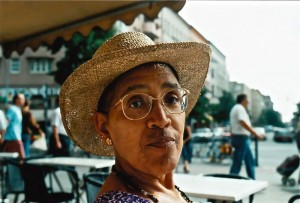
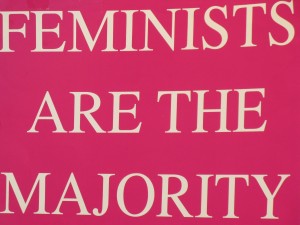
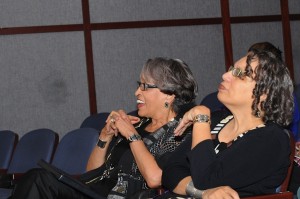
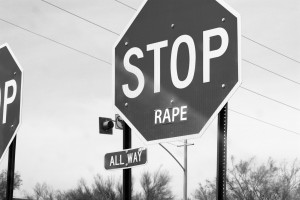

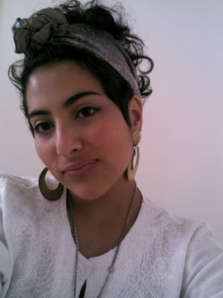

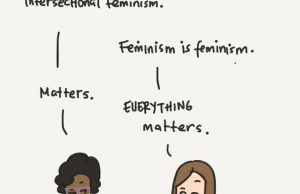

Pingback: The Battle Against Misogyny at Spelman College | thefeministblogproject
Pingback: Afterword: Standing at the Lordean Shoreline - The Feminist Wire | The Feminist Wire